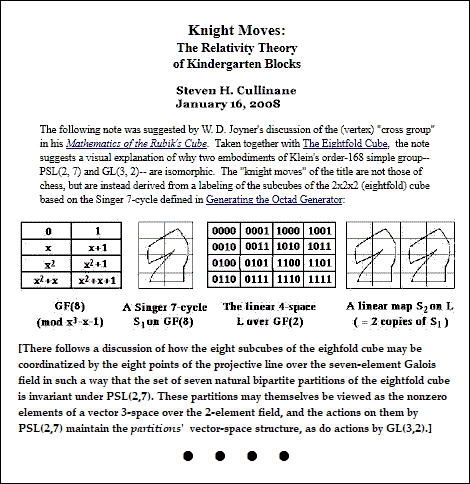The Echo
in Plato’s Cave
“It is said that the students of medieval Paris came to blows in the streets over the question of universals. The stakes are high, for at issue is our whole conception of our ability to describe the world truly or falsely, and the objectivity of any opinions we frame to ourselves. It is arguable that this is always the deepest, most profound problem of philosophy.”
— Simon Blackburn, Think (Oxford, 1999)
Michael Harris, mathematician at the University of Paris:
“… three ‘parts’ of tragedy identified by Aristotle that transpose to fiction of all types– plot (mythos), character (ethos), and ‘thought’ (dianoia)….”
— paper (pdf) to appear in Mathematics and Narrative, A. Doxiadis and B. Mazur, eds.
Mythos —
A visitor from France this morning viewed the entry of Jan. 23, 2006: “In Defense of Hilbert (On His Birthday).” That entry concerns a remark of Michael Harris.
A check of Harris’s website reveals a new article:
“Do Androids Prove Theorems in Their Sleep?” (slighly longer version of article to appear in Mathematics and Narrative, A. Doxiadis and B. Mazur, eds.) (pdf).
From that article:
“The word ‘key’ functions here to structure the reading of the article, to draw the reader’s attention initially to the element of the proof the author considers most important. Compare E.M. Forster in Aspects of the Novel:
[plot is] something which is measured not be minutes or hours, but by intensity, so that when we look at our past it does not stretch back evenly but piles up into a few notable pinnacles.”
Ethos —
“Forster took pains to widen and deepen the enigmatic character of his novel, to make it a puzzle insoluble within its own terms, or without. Early drafts of A Passage to India reveal a number of false starts. Forster repeatedly revised drafts of chapters thirteen through sixteen, which comprise the crux of the novel, the visit to the Marabar Caves. When he began writing the novel, his intention was to make the cave scene central and significant, but he did not yet know how:
When I began a A Passage to India, I knew something important happened in the Malabar (sic) Caves, and that it would have a central place in the novel– but I didn’t know what it would be… The Malabar Caves represented an area in which concentration can take place. They were to engender an event like an egg.”
— E. M. Forster: A Passage to India, by Betty Jay
Dianoia —
Flagrant Triviality
or Resplendent Trinity?
“Despite the flagrant triviality of the proof… this result is the key point in the paper.”
— Michael Harris, op. cit., quoting a mathematical paper
Online Etymology Dictionary:
flagrant c.1500, “resplendent,” from L. flagrantem (nom. flagrans) “burning,” prp. of flagrare “to burn,” from L. root *flag-, corresponding to PIE *bhleg– (cf. Gk. phlegein “to burn, scorch,” O.E. blæc “black”). Sense of “glaringly offensive” first recorded 1706, probably from common legalese phrase in flagrante delicto “red-handed,” lit. “with the crime still blazing.”
A related use of “resplendent”– applied to a Trinity, not a triviality– appears in the Liturgy of Malabar:
— The Liturgies of SS. Mark, James, Clement, Chrysostom, and Basil, and the Church of Malabar, by the Rev. J.M. Neale and the Rev. R.F. Littledale, reprinted by Gorgias Press, 2002
On Universals and
A Passage to India:
“”The universe, then, is less intimation than cipher: a mask rather than a revelation in the romantic sense. Does love meet with love? Do we receive but what we give? The answer is surely a paradox, the paradox that there are Platonic universals beyond, but that the glass is too dark to see them. Is there a light beyond the glass, or is it a mirror only to the self? The Platonic cave is even darker than Plato made it, for it introduces the echo, and so leaves us back in the world of men, which does not carry total meaning, is just a story of events.”










